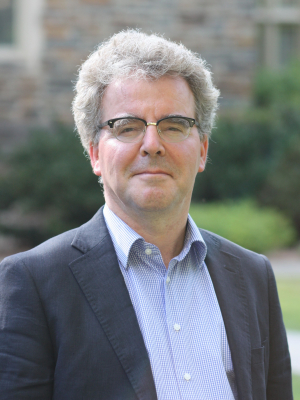Marcel Boumans has been connected to the history of economics program at Duke since the early 1990s, when, as a PhD student at the University of Amsterdam, Neil De Marchi was his principal advisor.
His first visit to Duke was in 1991, as a participant in the HOPE conference on Phil Mirowski's book More Heat than Light. He has made return visits to Duke several times since then, including this past summer, when he taught sessions on the history of econometrics for the Summer Institute.
A professor in the Faculty of Economics and Business at the University of Amsterdam and at the Erasmus Institute for Philosophy and Economics at Erasmus University Rotterdam, Marcel writes about mathematical economics and econometrics, combining history and philosophy in his approach.
Visiting Duke, he says, always gives him the chance to converse with other scholars who share his interests, scholars who have different views and make challenging points. "It is especially the young scholars who often have something important to contribute. They come up with new approaches that I find illuminating." To encourage even more interaction among the fellows, Marcel started a reading group; the first book the group will read will be Mary Morgan's The World and the Model, which was published by Cambridge University Press just this fall.
During his fellowship at the HOPE Center, Marcel hopes to reexamine the papers of Oskar Morgenstern, one of the founders of game theory. He first went through the papers, which are part of the Economists' Papers Project and are housed in the David M. Rubenstein Rare Book and Manuscript Library at Duke, when he was researching his dissertation. Back then, he was interested in Morgenstern's involvement with the Institute for Business Cycle Research, in Vienna. Today, Marcel wants to use the papers to learn more about Morgenstern's interactions with the RAND Corporation.
While at Duke, Marcel is teaching two courses. One, with E. Roy Weintraub, is on the history of modern economics; the other is on philosophy and economic method.
He will also be researching what he calls "measurement outside the laboratory." As he explains, measurement in economics involves statistical and econometric models, but to assess the validity of the models, the subjective judgments of experts are required. One of Marcel's aims is to understand how the subjective dimension of expert judgments is reconciled with the objective ideal of models.
Marcel will return to the Netherlands in December.
